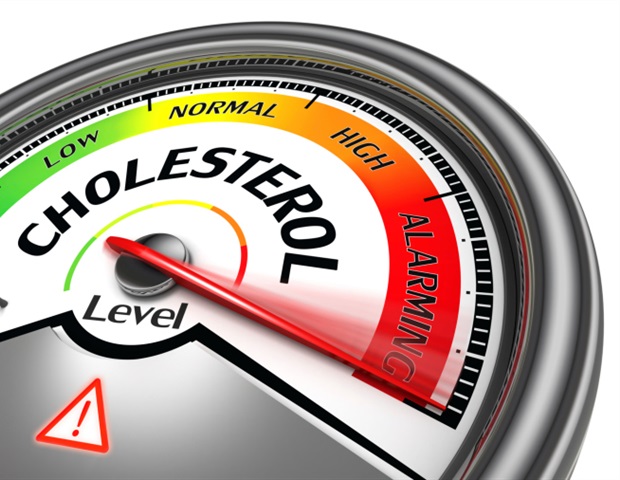

High cholesterol is a common health condition in the United States. In fact, nearly 94 million adults over the age of 20 have what could be considered borderline high cholesterol, according to the Centers for Disease Control and Prevention. Yet because this condition often presents without symptoms, many are not aware they have high cholesterol until they visit their doctor.
This article provides physicians with a platform to share what they want patients to understand about today’s health care headlines.
There’s good and bad cholesterol
“Overall, cholesterol is important for our bodies. We use cholesterol to do a variety of things,” said Dr. Kirley. “Our body creates cholesterol whether we eat it or not and it’s good to have for certain functions within our bodies.
“But there are some types of cholesterol that are potentially helpful and protective,” she added. “We usually think of HDL, or high-density lipoprotein, cholesterol as somewhat protective for our hearts and blood vessels because it absorbs cholesterol and carries it back to the liver.”
“We tend to think of LDL cholesterol, or low-density lipoprotein, as the main type of cholesterol that we focus on as a potentially harmful cholesterol for our hearts because it collects in the walls of your blood vessels,” said Dr. Kirley.
Triglycerides are closely related
Another thing to keep in mind is triglycerides, which “are a type of fat or lipid that are most influenced by what we eat and they are closely related to cholesterol,” said Dr. Kirley. “Our triglyceride levels are changing throughout the day, and they can be a risk factor for heart attack and stroke.
“When visiting your doctor for blood tests, what you’re actually getting is a test of a few different forms of lipids or cholesterol,” she added. “We will also see what triglyceride levels look like when you get a cholesterol test done. That’s another thing a physician is looking at to decide whether they need to offer medications to manage those levels as well.”
Your body naturally makes cholesterol
“One of the biggest things we see is that people think their levels are more tied to what they eat than they really are,” said Dr. Kirley, adding that people tend to think “if your levels are high, that means I should eat less.
“The amount of food that you eat, doesn’t actually impact your own cholesterol very much,” she noted. “And that’s because your body is making it. It makes the bad form no matter what. Even if you eat no cholesterol, your body makes it.”
“What you eat matters, but it has less impact on your levels than a lot of people might realize,” Dr. Kirley said.
The focus isn’t on specific levels
“We’ve actually gotten away from hard and fast levels of cholesterol for people,” said Dr. Kirley. “We look at their cholesterol numbers along with a number of other risk factors for heart disease and stroke.”
This includes “things like your blood pressure and whether you have diabetes, and we estimate your overall risk for heart attack and stroke and how much cholesterol plays into that,” she said. “Then we may recommend taking a medication that lowers cholesterol if we think it will help lower your risk for heart attack and stroke.”
High cholesterol runs in the family
“Oftentimes, one of the biggest factors that determines your levels is your genes,” said Dr. Kirley. “How your genes affect is pretty complicated, but it’s safe to say that it tends to run in families.
“For most people, genetic testing isn’t necessary or helpful unless they have very high cholesterol levels,” she added. “And because genes are something we can’t change this is why medications are an important tool for treating it.”
There are no warning signs
“Typically, there are not really warning signs for people with high cholesterol,” said Drcho. Kirley, noting “there are some relatively uncommon disorders where people can get physical symptoms like lesions on their skin, but those are quite uncommon.
“For the most part, the only way you can get insight into your cholesterol levels and how they might play into your risk for heart attack and stroke is to be evaluated by your physician and have your levels tested with a blood test,” she added.
Have your cholesterol levels tested
As for how often a person should have their levels tested, “for many people, it does not need to be a yearly test,” said Dr. Kirley. “The guidelines have been evolving about this in terms of what age you need to start getting it tested and how frequently.
“For most adults, it’s good to have them checked at least once so you have a general idea about where your levels may be and what your risk may be,” she added. “And then for people who have risk factors like high blood pressure or older age, we may start checking every few years or so.”
Start taking a statin medication
“For most people who have moderate to high risk for heart attacks and strokes, the best thing that we can do to both impact their cholesterol levels and impact their overall risk for stroke and heart attack is start a statin medication,” said Dr. Kirley. “A statin medication changes the way cholesterol is metabolized in your body so that you ultimately have lower levels of cholesterol circulating in your bloodstream, particularly that LDL cholesterol that we worry about.”
“We often hear a lot of fear around taking statin medications,” she said. “Perhaps the biggest misconceptions I see are that these medications are not safe or that they cause other diseases.
“Statin medications are among the most studied medications that we use in medicine. They have a wonderful safety profile and great evidence for effectiveness,” Dr. Kirley added.
Other health conditions play a role
“There are many factors that contribute to high cholesterol like genetic family history and our environments,” said Dr. Kirley, noting that “we don’t necessarily understand very well how our environments contribute to our cholesterol levels yet.”
But “having other health conditions can definitely impact your levels,” she said. For example, “having type 2 diabetes and other inflammatory conditions can impact your levels.
“Other medications that you take can also impact your cholesterol levels,” she added.
Have your cholesterol levels tested
As for how often a person should have their cholesterol levels tested, “for many people, it does not need to be a yearly test,” said Dr. Kirley. “The guidelines have been evolving about this in terms of what age you need to start getting your levels tested and how frequently.
“For most adults, it’s good to have them checked at least once so you have a general idea about where your levels may be and what your risk may be,” she added. “And then for people who have risk factors like high blood pressure or older age, we may start checking every few years or so.”
Don’t rely on behavioral changes alone
“People ask a lot about behavioral changes that they can make to impact their levels,” said Dr. Kirley. This includes “changing what they eat and their physical activity levels.”
“We see that increasing physical activity and eating a generally more healthful diet can be helpful for levels, but these changes tend to have a relatively small impact on cholesterol levels,” she said. “Eating more veggies, eating less saturated fat and getting more physical activity – those are wonderful things for your health and we totally recommend them—they reduce your risk for heart attacks and strokes overall,” Dr. Kirley added. “But they tend to not change your levels very much.”
Start taking a statin medication
“For most people who have moderate to high risk for heart attacks and strokes, the best thing that we can do to both impact their cholesterol levels and impact their overall risk for stroke and heart attack is start a statin medication,” said Dr. Kirley. “A statin medication changes the way it is metabolized in your body so that you ultimately have lower levels circulating in your bloodstream, particularly that LDL that we worry about.”
“We often hear a lot of fear around taking statin medications,” she said. “Perhaps the biggest misconceptions I see are that these medications are not safe or that they cause other diseases.
“Statin medications are among the most studied medications that we use in medicine. They have a wonderful safety profile and great evidence for effectiveness,” Dr. Kirley added.
Other health conditions play a role
“There are many factors that contribute to high cholesterol like genetic family history and our environments,” said Dr. Kirley, noting that “we don’t necessarily understand very well how our environments contribute to our cholesterol levels yet.”
But “having other health conditions can definitely impact,” she said. For example, “having type 2 diabetes and other inflammatory conditions can impact your cholesterol levels.
“Other medications that you take can also impact your levels,” she added.
Cholesterol and high BP run together
It is important to note that “high cholesterol and high blood pressure tend to run together,” said Dr. Kirley. “One doesn’t necessarily cause the other, but it’s very common to see both in an individual.
“And certainly, both of them contribute to raising somebody’s risk for heart attack and stroke,” she added, noting that “the interventions to help—things like more physical activity and nutrition—can impact both your blood pressure and your cholesterol.”
more recommended stories
 Texas Medical Board Releases Abortion Training for Physicians
Texas Medical Board Releases Abortion Training for PhysiciansKey Takeaways Texas Medical Board has.
 Safer Allogeneic Stem Cell Transplants with Treg Therapy
Safer Allogeneic Stem Cell Transplants with Treg TherapyA new preclinical study from the.
 Autoimmune Disorders: ADA2 as a Therapeutic Target
Autoimmune Disorders: ADA2 as a Therapeutic TargetAdenosine deaminase 2 (ADA2) has emerged.
 Kaempferol: A Breakthrough in Allergy Management
Kaempferol: A Breakthrough in Allergy ManagementKaempferol, a dietary flavonoid found in.
 Early Milk Cereal Drinks May Spur Infant Weight Gain
Early Milk Cereal Drinks May Spur Infant Weight GainNew research published in Acta Paediatrica.
 TaVNS: A Breakthrough for Chronic Insomnia Treatment
TaVNS: A Breakthrough for Chronic Insomnia TreatmentA recent study conducted by the.
 First-of-Its-Kind Gene-Edited Pig Kidney: Towana’s New Life
First-of-Its-Kind Gene-Edited Pig Kidney: Towana’s New LifeSurgeons at NYU Langone Health have.
 Just-in-Time Training Improves Success & Patient Safety
Just-in-Time Training Improves Success & Patient SafetyA study published in The BMJ.
 ChatGPT Excels in Medical Summaries, Lacks Field-Specific Relevance
ChatGPT Excels in Medical Summaries, Lacks Field-Specific RelevanceIn a recent study published in.
 Study finds automated decision minimizes high-risk medicine combinations in ICU patients
Study finds automated decision minimizes high-risk medicine combinations in ICU patientsA multicenter study coordinated by Amsterdam.

Leave a Comment